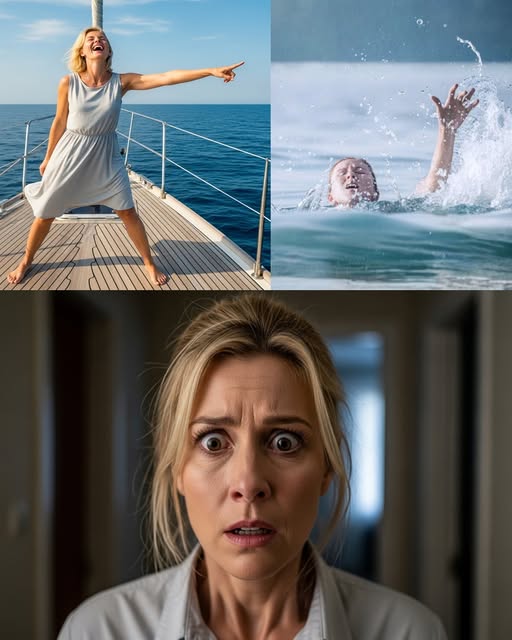The Pierce estate shimmered under the soft glow of chandeliers, a perfect picture of elegance and power—the kind of place where nothing ever seemed amiss. Guests wandered the marble halls, admired the rare art, and murmured praises for the manicured gardens beyond the glass. I moved among them in my sapphire gown, every smile rehearsed, every gesture deliberate—the flawless image of a devoted wife. Samuel, my husband, charmed senators, CEOs, and socialites with his practiced ease. Our marriage had become a brand, a performance. And then Heather arrived.
She wore crimson silk and exuded a confidence that filled the room. She introduced herself as an investor, but Samuel’s warm, familiar smile betrayed more than business ties. Her fingers lingered on his shoulder longer than necessary, a small spark of audacity in her gaze as she caught me watching. I would later discover that Heather was no stranger—she was my sister, and the woman Samuel had quietly installed as both mistress and co-conspirator.
Two weeks later, Samuel suggested a weekend yacht trip—just the two of us and “a trusted friend.” The sea was a smooth, black expanse, the sky dimly lit with twilight. Champagne and forced laughter attempted to fill the void left by trust that had long since eroded. At midnight, on the upper deck, Heather leaned close and whispered, “Say hello to the sharks,” before driving her hands hard into my ribs.
I plunged into the cold, dark water. Samuel’s face hovered above me for a heartbeat—calm, almost relieved. Shock and icy pain tore through me, but instinct and survival took over. Swim parallel, conserve energy, count breaths. The tender they’d lowered earlier thudded somewhere nearby; guided by the faint hum of its engine and the smear of moonlight, I found the rope ladder and clung until nausea passed.
Climbing aboard, the reality settled: no one on that yacht would look for me. To uncover the truth, I’d need to let them believe the ocean had claimed me.
I vanished deliberately.
Lights off, drifting until dawn, I was rescued by a fishing trawler, its captain too polite to ask questions. With a burner phone, a wire transfer from a secret account I had prepared, and a discreet ride to shore, I disappeared entirely. For three days, I lived in a small anonymous motel, focusing on what Samuel always underestimated me for: preparation and strategy.
I contacted only the people I could trust—my estate attorney and a forensic accountant I’d met at a charity audit. Together, we locked down my holdings, enacted emergency protocols, and froze discretionary accounts. My meticulously crafted prenuptial agreement had a crucial clause: any attempt on my life to seize control of my estate would immediately void his rights.
Meanwhile, my team tracked the money. Samuel and Heather’s scheming left traces—shell companies, retitled properties, new signatories on dormant accounts. There is always a trail.
News of my “disappearance at sea” broke by noon. Samuel’s public mourning was perfect—red-rimmed eyes, trembling voice, praise for “the love of his life.” Heather, a mere “family friend,” appeared in photos wearing my scarf. Behind the scenes, they tried to assume control of our shared assets. Our investigator documented intimate meetings, coded handoffs, and even a safety deposit box opened under a false name tied to Samuel’s old shell company.
A week later, I returned—not with fanfare, but with evidence. My attorney and two detectives flanked me as I placed a white box on the console. Inside: bank slips, vault footage, Heather’s yacht confession, and my notarized prenup clause. The law moved before Samuel or Heather could react. Emergency suspensions were issued; a court date set.
The hearing was surgical. Facts, not emotion, guided the process: timelines, recordings, financial trails, and maritime reports proving no distress call had been made. The judge froze contested accounts, removed Samuel from control of family and foundation assets, and a grand jury began considering conspiracy, fraud, and attempted homicide. By week’s end, Samuel was “taking time with family,” while Heather faced legal scrutiny.
I remained in my home, keeping my staff and routine. Six months later, I hosted a gala for the Oceanlight Initiative—a foundation supporting maritime safety, search-and-rescue training, and survivor assistance. Heather’s background as a “sister” was revealed to be a fabricated claim, a manipulation designed for control. Family, I realized, is defined by action, not blood.
Months later, I sent both Samuel and Heather packages: a photo of the dawn over the ocean, horizon straight and clear, with a simple note:
“Here is the view you tried to give me forever. I returned it and chose my own. That is the only gift I owe you.”
This story proves that preparation, vigilance, and alliances can outmatch deception and betrayal. Contracts, evidence, and strategy can defeat conspiracies dressed as love. And if pushed—literally or figuratively—survival comes from controlling the air you breathe, and never surfacing until it is yours to claim.

I love getting up in the morning and reading your short stories, don’t know if they are true or not, but I love to read, and with my busy life, I truly enjoy
all you write keep up the good work,